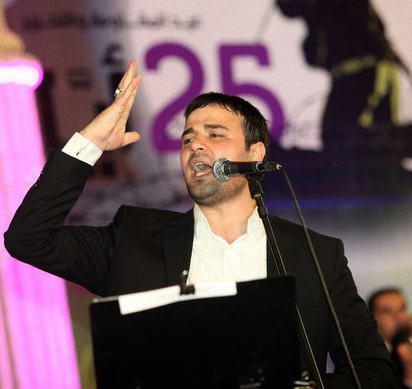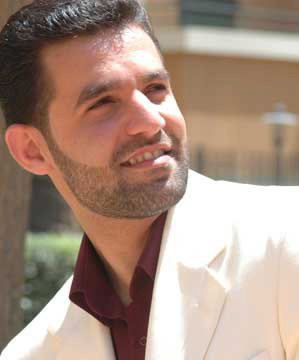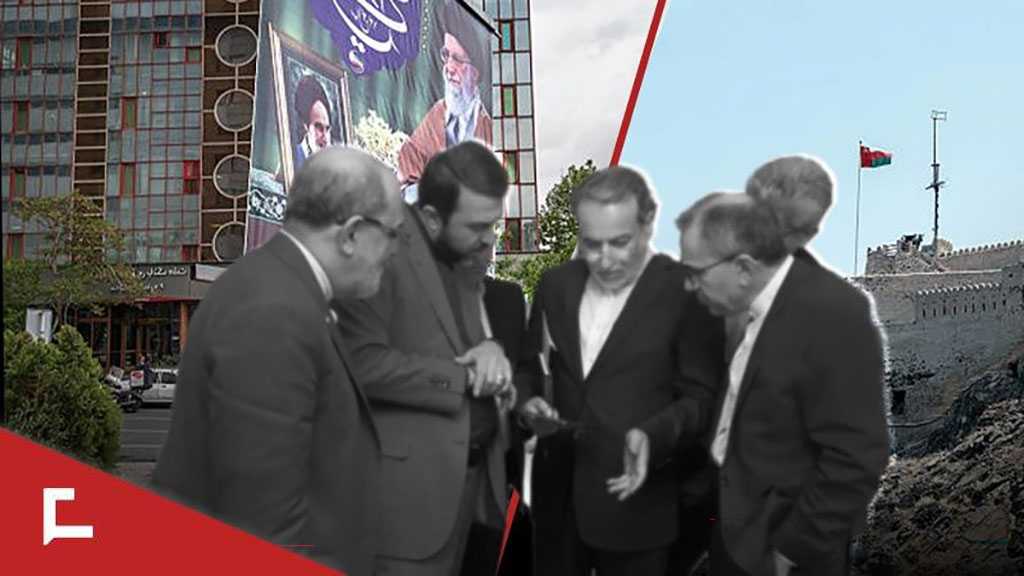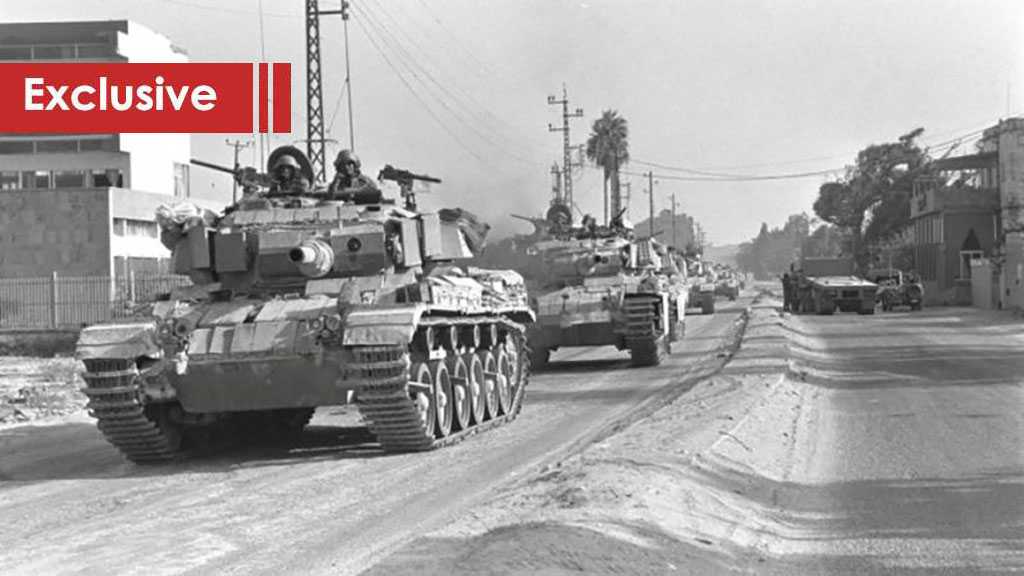
Vocal Chords: A Forever Living Weapon!

1982...the "Israeli" enemy set foot on our land, by that giving birth to a youth resistance movement on both, popular and military level.
People, young and old, voiced their rejection to the occupation, in an awakening that illustrated their ultimate support to resistance.
Resistance relied on the various methods adopted by society to stand up against the usurping entity. Not only was the resistance a bunch of armed men on the frontlines, but also there were hundreds of poets, journalists, and other men of letter armed with the words, writings, and voice.
More "colors and themes" of resistance emerged, one of which accompanied the resistance movement since the 1982 and has become a great part of it. It is the "song" [Nashid] of the resistance or the "voice of the resistance".
In this context, Ali al-Attar, a singer, or what we call "Munshid" chose this theme and aced it. He expressed that these "resistance songs" came to light in Lebanon alongside the resistance movement which was steadfast in face of the "Israeli" enemy in 1982, still vibrant."
Resistance in Lyrics and Notes
"During the modest period back then, the youth launched a new theme of songs illustrating the resistance and revolution along with the resistance. It had a positive spiritual impact on the popular and military arenas, where this theme enhanced the spirit of challenge and solidity," he highlighted.
In an interview with Moqawama.org, al-Attar believed there is an important bond between the people and the song, which had an impact on the fire-front resistance fighters. The lyrics, the music, the beat formed a "mélange" that gave them high spirits, full of deterrence against the "Israeli" enemy.
 Furthermore, resistance singer [Munshid] Ali al-Attar went on to say, "One of the resistance fighters told me that during the July 2006 war, they listened to the resistance songs, as these motivated them and enhanced the momentum, determination of the Mujahideen and the people".
Furthermore, resistance singer [Munshid] Ali al-Attar went on to say, "One of the resistance fighters told me that during the July 2006 war, they listened to the resistance songs, as these motivated them and enhanced the momentum, determination of the Mujahideen and the people".
"With its goals, spiritual and moral dimensions, the resistance ‘Nashid' is a basic support for the resistance and its people. This was proven throughout the July 2006 war", Ali al-Attar affirmed.
On another hand, al-Attar believed that nowadays, these songs constitute a banner and reflect a bright image of the resistance. These also represent a vital part of the resistance history in defeating the enemy.
On the psychological warfare level, of which these songs form a major part, Ali al-Attar said "even the "Israeli" enemy broadcast reports about the revolutionary resistance songs several times, in reference to how "Hizbullah deals with "Israel" on the levels of media and art".
He recalled the incident when a soccer team's coach displayed a Lebanese song for his team, which was then playing against a Zionist team. Al-Attar described how the Zionist team lost the game because it was distracted and negatively affected by the "Hizbullah Resistance" song while the other team was enthusiastic.
"I believe the resistance songs give us momentum and determination. The Zionist enemy is now aware of this situation. This enemy realized the impact of this theme of Nashid on the souls of our people especially if they had goals and served a cause", al-Attar reaffirmed.
Fighting the Battle Through Nashid
Regarding his personal experience in the field of the Nashid for the resistance and the revolutions, al-Attar added, "I consider myself as the singer [Munshid] of the resistance, and part of the resistance and its audience. I hope that through every show I present I would represent the resistance and Mujahideen".
Munshid Ali al-Attar also shed light on the Baalbek Festival held on the 5th year anniversary of the July war victory saying, "When I went on stage, I looked at the resistance audience who came to take part in the festival and listen to the songs. I cried after I saw the audience, among which were old ladies, expressing deep love for the resistance and for the voice of the resistance", al-Attar describes the scene.
"At that point, I felt I was a resistant fighter fighting the battle my own way, and I felt a big load of responsibility", he further expressed.
On a different level, al-Attar stated the importance of resistance songs played in the defiant society.
"We all suffered from the "Israeli" occupation and through this theme of songs, we derive our determination, we face the Zionist enemy with our word and voice as these form a moral and spiritual motivation", al-Attar reiterated.
Resistance..Only In Hebrew
On another note, al-Attar told moqawama.org that he and his team are now working on translating and producing a resistance song (A'ala el-Jibal, Arabic for Over the Mountains) into Hebrew and English.
"God willing this Nashid will be translated and broadcast in other languages for what it has of sublime messages and meanings", he added.
Al-Attar affirmed that this "color of resistance"; the resistance Nashid, consists a hard duty that brings along loads of responsibility.
"The resistance songs address all resistance peoples in Lebanon or outside Lebanon. On this level, we notice in the resistance ceremonies and festival, foreigners attending the events, including maybe Arab and Western tourists, among them people who repeat the songs with us as if they know them by heart", he said.
Al-Attar, who has devoted his voice to deliver the message of resistance, self sacrifice, and love to a suppressed homeland is only one among many who have went down this path.
Zaiter..Among the First Voices of Resistance
Similarly, Hussein Zaiter, one of the first singers known to be part of this "theme of resistance" expressed to moqawama.org the importance of the voice in delivering the image of the resistance.
Zaiter, who has a Diploma in Arab-Eastern Music and Traditional Songs from Antoine University, also known for his approach to Islamic art and poetry, confirmed that there is an important bond linking between the poet, the voice and the tone of the song all together.
"Since the time of Prophet Mohammad (PBUH), poetry has had its importance, especially when it comes to delivering a piece of poetry in public through "voice", hence singing a Nashid. Most of such poetry aims to enhance the sense of determination during battles and wars. Therefore the poetry, or words, and the performance, together played an important role back then towards the culture of resistance, just like they remain to be so today", Zaiter affirmed.
 "There is no doubt that the "voice of the resistance" is a part of the overall resistance work, which gives strength of mind and soul. The resistance songs should represent our culture, and the Munshid must be capable of holding the responsibility accompanied by this "color of resistance"", Munshid Hussein Zaiter stated.
"There is no doubt that the "voice of the resistance" is a part of the overall resistance work, which gives strength of mind and soul. The resistance songs should represent our culture, and the Munshid must be capable of holding the responsibility accompanied by this "color of resistance"", Munshid Hussein Zaiter stated.
Furthermore, he explained that the resistance "songs" displayed before the year 2000 South Lebanon Liberation are different from those displayed after the 2000 liberation.
"After the 2000, our society became open to other cultures, and started depending on "solo" performance rather than group performance", he clarified.
On the "Israeli" level, Hussein Zaiter stated that the resistance songs are of intense impact and have major psychological effect on the "Israeli" enemy. "All the elements of the resistance song are related to each other; the good voice, rhythm, poetry and production and even the performance of the Munshid and the choral group", Zaiter affirmed.
He also added, "The listener therefore is not only concerned with the rhythm or the art, but is also eager to understand the inspiring messages behind the words, which mainly call for the culture of resistance".
Zaiter reiterated that he, like others, has derived their inspiration from their roots; which is the resistance movement launched by Prophet Mohammad and his household, especially Imam Hussein (as).
At the end of the interview, Munshid Hussein Zaiter stated to moqawama.org that he is now preparing a new "resistance" record that will serve the Arab-Eastern culture, and thus would address all that sects of society in Lebanon and abroad.
The people's faith in their resistance has sky-rocketed, and voicing this resistance has increased for every time the resistance proves to be victorious, the "resistance people" become proud, and look forward to see more "resistance to be voiced".
Comments



